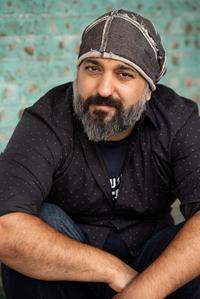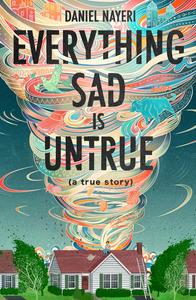 Daniel Nayeri was born in Iran and spent several years as a refugee before immigrating to Oklahoma at age eight with his family. He is the publisher of Odd Dot, an imprint of Macmillan. He has served on the CBC diversity committee and the CBC panel committee. Nayeri's autobiographical novel, Everything Sad Is Untrue (a true story), published by Levine Querido, won the 2021 Michael L. Printz Award for Excellence in Young Adult Literature.
Daniel Nayeri was born in Iran and spent several years as a refugee before immigrating to Oklahoma at age eight with his family. He is the publisher of Odd Dot, an imprint of Macmillan. He has served on the CBC diversity committee and the CBC panel committee. Nayeri's autobiographical novel, Everything Sad Is Untrue (a true story), published by Levine Querido, won the 2021 Michael L. Printz Award for Excellence in Young Adult Literature.
Congratulations, Daniel! How does it feel to win this award now? And for this specific story?
The day it was announced, I felt two cavities suddenly show up in my molars. It could have been my steady diet of pastries over the last year. But it could have also been the universe saying, "easy there, buddy, you're throwing off the joy balance." And, you know what, that seems fair. Another way to answer this question is that it felt great! And for this story, the story of four generations in my family? Even better! It was joyous leaping in the air with unreserved guffaws and belly-laughter. Wait. Hold on, I think my nose is bleeding.
 Do you think that, as both a creator and someone who works in the publishing industry, this award means something different to you?
Do you think that, as both a creator and someone who works in the publishing industry, this award means something different to you?
Yes, I think my knowledge of the industry helps me understand the sheer improbability of it all. I know the staggering number of titles published every year, the difficulty of getting a starred review and all the work that goes into a single publicity piece. I know how much it costs to have deckled edges, the pub dates to avoid and the fact that when it comes down to it, any given piece of art is nigh incomparable to another. As a writer, I wish I didn't know these things. The metaphor in my head is that it feels like a surgeon having to do surgery on his own kid. Sure, I know the process. But my goodness, I don't want to think about those decisions for my own dreams. I suppose what I'm saying is that I'm particularly aware that any small attention a book receives is a gift.
In a previous interview about this book, you said Khosrou, the narrator, "is me, and so he bears many of the flaws of my character." Is there something resonant or affirming (or any other word that seems appropriate) about receiving an award for highlighting that voice?
Well, in one sense it could be read as everyone saying, "that was, indeed, a great depiction of all the flaws in Daniel's character!" To which I would say, "Yes, thanks, I was not unaware of them." But in another sense--probably the one you were intending--there was something reassuring about the fact that this story I had been keeping with me all my life, polishing in the quiet hours and researching and revising and reliving, was all worth sharing. Beyond that, I become irrelevant, and the book goes out into the world to befriend some reader, and I hope they have a meaningful and useful conversation with one another.
You also described the format of the book: "Khosrou tells these stories--his family history, Persian folklore and the history of the country--to a fundamentally skeptical audience of classmates. This is the dynamic of Scheherazade in the One Thousand and One Nights.... If she fails, she dies. If he fails, he dies the way kids die in middle school. He's hated and given wedgies until kingdom come." How do you think Khosrou would incorporate this accomplishment into his life story?
That's a great question. The Khosrou of the book still has years of growing up to do before he can imagine himself safe enough, or be strong enough not to care, about putting himself on such a public stage. He still has to struggle with hiding everything he loves from a world he perceives as hunting for them. But he'll prevail, I'm sure. I suppose it's impossible for me to imagine him doing anything other than what I did, which is that he'll dedicate it all to his mom. --Siân Gaetano, children's and YA editor, Shelf Awareness

